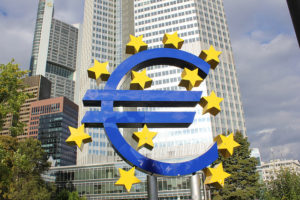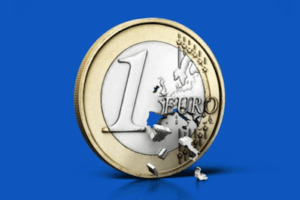The Root of Europe’s Problem
Most of the damage to the European economy was done by innocent submission of credulous policymakers to the conventional wisdom of the international marketplace.
The belief widely held is that enlarged federalism is the appropriate response to the economic crisis provoked by the Wall Street credit crash. Why? Fundamental to the crisis is the degree of federation it already has. Seventeen economically disparate nations bound their fortunes together in creating the euro zone, and it is exactly this that has thrown the European project into crisis.
Large parts of the populations of Greece, Spain and Portugal have been forced into destitution; the economies of all 17 members of the euro zone have been gravely damaged; governments of the weaker countries have been stripped of policy autonomy and placed under the tutelage of a “troika” of foreigners from the EU Commission, the International Monetary Fund and the European Central Bank, who are imposing uniform, highly controversial and thus far generally unsuccessful austerity programs.
How would a strengthened European federation improve this situation? Advocates of federation can argue that if the individual states of the EU were under federal authority, they would not have been allowed to get into their present plight. But most of the damage was done by innocent submission of credulous policymakers to the conventional wisdom of the international marketplace, the self-interested advice and investment promotions of the international investment banks, and discredited academic theories of deregulated and autonomous “perfect” markets. If the European Union had become a federation when it expanded in 2004, can we believe that its leaders would have done otherwise? The whole European economy might be in worse shape than it is now.
The writer Timothy Garton Ash wants Europe to “save” itself by “moving toward closer fiscal and political union.” This is Angela Merkel’s position as well. From Chancellor Merkel’s viewpoint, this might seem a solution because it implies a much more influential role for Germany. I think she underestimates the resistance of the smaller European countries to any federal authority (or indeed, to adoption of such a project).
Would federal authority have an answer to the authoritarian trends in the present internal politics of Hungary, Bulgaria and Romania — the kind of practices that gave the Balkans a bad name in the past? What can be expected from such candidate members as Macedonia, Montenegro and Serbia in a new federation? Garton Ash knows the Balkans much better than most people, as well as the mafias in that part of Europe.
The United States is usually cited by Europeans as an example of successful federation. It was in the beginning a group of 13 states with a shared language, literature, history, a common intellectual and moral formation, Christian religious values (despite major sectarian differences), and which possessed common expectations and understandings of politics and history. Nonetheless, the objections of the Southern states to yielding what originally had been understood as irrevocable state sovereignty were only overcome by a terrible civil war.
The degree of integration and political agreement the major powers of Europe now have achieved came after centuries of rivalry among the British, Germanic, French, Spanish, Danish and Swedish peoples, to speak only of the traditional great powers of Western Europe, plus a profusion of wars culminating in two immense wars fought in nearly every quarter of the world. To think this is all over, and that European history has come to an end, defies the global political landscape of the present day.
NATO’s Secretary-General Anders Fogh Rasmussen does his best to prepare and arm the European members of the alliance for “key security threats from global challenges.” Would a European federation go abroad to fight global threats? Which ones? European analysts argue that Europe’s present quasi-disarmed condition forfeits global influence. It does, but are Germany, Sweden, Slovenia, Macedonia, Italy, Spain and all the others in the EU prepared to commit troops to a European foreign expeditionary army to recover Europe’s world influence?
To my foreigner’s eyes, the future of Europe best lies in the union it already possesses. I am confident that the euro can and should survive, but possibly as part of a double-currency system in economically weaker countries, where the euro would function as the international exchange currency and the reference value for floating national currencies.
There would be a common foreign policy exercising probably the world’s most powerful armory of the instruments of “soft” power. The major European states, the former “great powers,” could individually or cooperatively, according to their choice, play an armed role in the external world, as they do now, with such support and endorsement as their fellow EU members may wish to provide. In circumstances now unforeseeable, the Union as a whole might wish to adopt common defensive and deterrent measures. Europe in this way could be a different global “great power.”
Visit William Pfaff’s website for more on his latest book, “The Irony of Manifest Destiny: The Tragedy of America’s Foreign Policy” (Walker & Co., $25), at www.williampfaff.com. © 2012 Tribune Media Services, Inc.
Your support is crucial…With an uncertain future and a new administration casting doubt on press freedoms, the danger is clear: The truth is at risk.
Now is the time to give. Your tax-deductible support allows us to dig deeper, delivering fearless investigative reporting and analysis that exposes what’s really happening — without compromise.
Stand with our courageous journalists. Donate today to protect a free press, uphold democracy and unearth untold stories.









You need to be a supporter to comment.
There are currently no responses to this article.
Be the first to respond.